Iran-Backed Houthis Issue Threat Against Italy
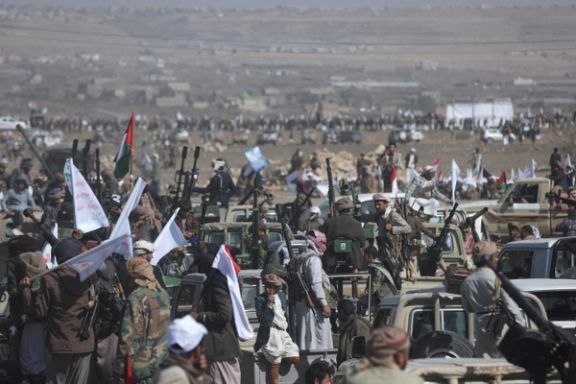
Iran-backed Houthis, who have been attacking international commercial vessels and navy ships in the Red Sea, have threatened to target Italy if it takes part in the US-led naval coalition.

Iran-backed Houthis, who have been attacking international commercial vessels and navy ships in the Red Sea, have threatened to target Italy if it takes part in the US-led naval coalition.
Mohamed Ali al-Houthi, head of the Houthi's supreme revolutionary committee, told daily La Repubblica that Italy must be neutral in the Israeli-Palestinian conflict and put pressure on Israel to stop attacks on Gaza.
His remarks came as Italy announced Friday that it would provide the admiral in command of a European Union Red Sea naval mission to protect ships from attacks by the Houthi militia.
"The European Union today asked Italy to supply the Force Commander for the Aspides Operation in the Red Sea," Italian Defense Minister Guido Crosetto said on Friday.
The mandate of the mission, which will be launched in mid-February, will be to protect commercial ships and intercept attacks, but not take part in strikes against the Houthis, EU's foreign policy chief Josep Borrell has said.
On Saturday night, in a joint operation with Britain, the United States initiated dozens of strikes against the Houthis, who have created insecurity in the Red Sea in a bid to force Israel into a ceasefire amidst the war in Gaza against the Iran-backed Hamas militia. Around 1,200 mostly civilians were murdered and at least 250 more taken hostage when Hamas invaded Israel on October 7.
As a result of the US support for Israel's right to defend itself, Iran's proxies have waged at least 160 attacks on US facilities across the Middle East since October 7. Houthis began attacking vessels in mid-November after Iran's ruler Ali Khamenei called on Muslims to blockade Israel.
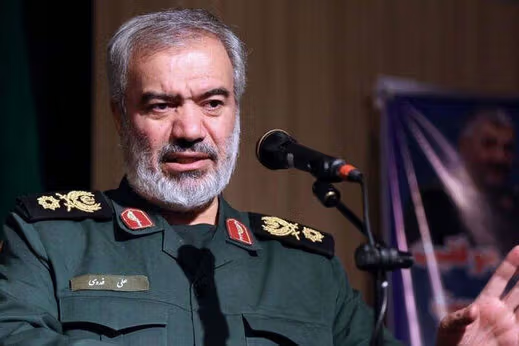
The United States did not even fire a shot at Iran, the deputy commander of the IRGC said Sunday, after Washington launched air strikes at Iran-linked military targets in Iraq and Syria on Friday.
Referring to the United States in the customary jargon of the Iranian regime, Ali Fadavi stated, "The united front of arrogance conspires against us, and at no point has such enmity been recorded against a nation, and these enemies themselves admit defeat, and in military matters, they have not even fired a single arrow toward this country.”
The Biden administration vowed retaliation after a drone launched by Iran-backed militia forces from Iraq hit a US military outpost in Jordan on January 28 killing three soldiers and wounding around 40 others. However, it took the administration more than five days to launch a series of air strikes against Iranian proxy forces in Iraq and Syria, giving ample time to key Iranian and allied personnel to vacate dangerous locations.
US officials indicated that they do not want to attack Iran directly and aim to prevent an escalation. Following the belated attack on proxies, Iranian officials got over the initial fear of ‘American wrath’, confident that there would be no attacks on targets inside Iran.
Fadavi also emphasized that Iran’s efforts against Israel were key to raise opposition to the Jewish state around the world. “Imam Khomeini called Israel a cancer in the region,” he highlighted, referring to the founder of the Islamic Republic.
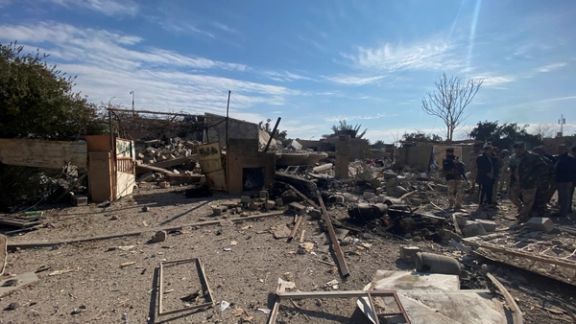
Several members of US Congress on Sunday slammed President Joe Biden for his failure to directly confront Iran even after its proxies killed three American soldiers in Jordan.
President Biden authorized airstrikes on dozens of targets in Syria and Iraq last Friday, five days after a drone attack on US base Tower 22 in Jordan by Iran-allied Kataeb Hezbollah. US officials announced that the strikes were the first in a series of retaliatory attacks against Iran’s Revolutionary Guards, aiming at degenerating their capacity to attack US troops and interests.
Not long after the airstrikes, however, IRGC announced that it had no personnel or interests in the targeted locations, raising suspicions that the delay in US military response had been a leeway for the Iranians to take out their forces.
“They keep saying that they want to retaliate, but then they say it’s about deterrence, then they say it’s about diminishing capabilities,” House Intelligence Chair Mike Turner said in an interview with CBS. “Those are all different goals and objectives. And they’re not doing any of those.”
“The administration has no policy with respect to Iran,” he added, “ how to diminish their capability, diminish these attacks and diminish their nefarious activities in the Middle East.”
Turner was by no means alone. All through the weekend, US Senators and Representatives appeared on major TV networks to discuss the crisis in the Middle East. And many were critical of the Biden administration and its responses to the loss of American lives.
“What we need to be doing right now is turning up the heat on Iran,” House Speaker Mike Johnson said on NBC, “we need to decimate Iran’s central bank…, we need to put maximum pressure on their oil exports. There’s a lot that we could do to Iran instead of this appeasement strategy.”
“We need to make clear to Iran that nothing is off the table,” Johnson said.
Reports coming from Iran seem to suggest that the regime has gotten over the initial fear of ‘American wrath’, presuming that there would be no attacks on targets inside Iran. Deputy commander of the IRGC, Ali Fadavi, said on Sunday that "not even one bullet was fired at Iran," calling US efforts to deter Iran a failure. The country’s military has even taken the opportunity to threaten the US.
Iran’s Army on Sunday issued a rare warning over its cargo ships Behshad and Saviz, which are thought to be helping the Houthis target commercial vessels in the Red Sea.
“Those engaging in terrorist activities against Behshad or similar vessels jeopardize international maritime routes, security and assume global responsibility for potential future international risks,” the video statement said.
Both Iran and the US say they’re not interested in going to war. But Biden’s national security advisor Jake Sullivan was not willing Sunday to exclude the option of an attack inside Iran. “I’m not going to get into what’s on the table and off the table, when it comes to the American response,” he said when asked by an NBC presenter about targets inside Iran.
Some experts say that with the large-scale attack on Iran-affiliated targets in Iraq and Syria, the Biden administration has taken the penultimate step and would have no choice but to hit the interests of the Iranian regime, if further attacks are launched against American troops.
If markets in Iran are any measure to go by, the general feeling in the country is that that is not going to happen. The currency (rial) regained much of what it had lost against the US dollar in anticipation of the US offensive last week. Senior regime officials also seem to have regained their confidence, as seen in the propaganda video by Iran’s Army.
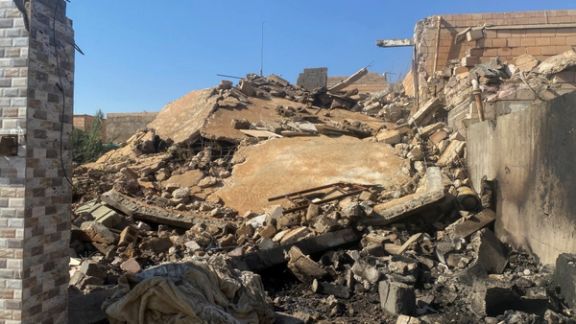
Despite ongoing US strikes against Iran-backed militias in Iraq and Syria, no Iranian personnel have been reported killed thus far, according to The Wall Street Journal.
The strikes, initiated after a drone attack in Jordan on January 28 that resulted in the deaths of three US troops and injuries to over 40 others, have yet to directly target Iranian forces.
The recent attacks in western Iraq near the Syrian border resulted in the deaths of 16 Iraqis with an additional 25 people wounded. Telegram channels affiliated with Iran’s Revolutionary Guards shared images of 10 Iraqi militiamen purportedly killed in the strikes.
Amid Washington's publicized intentions to target Iranian allies in the region, Tehran seems to have had time to prepare and relocate its personnel, avoiding significant casualties among senior Revolutionary Guard members.
“As long as US strikes in Iraq and Syria avoid killing senior Iranian Revolutionary Guard personnel, Tehran is unlikely to respond in kind,” added the report.
Some commanders in eastern Syria have reportedly moved to safe houses in densely populated areas or to southern regions where they can blend in with Syrian and Russian military forces.
Meanwhile, in Yemen, approximately 50 advisers from Iran's Guards and Hezbollah have relocated from coastal areas, where they were involved in missile and drone attacks on ships, to San'a, the de facto capital of the Houthi rebels.
While the US strikes may lead to a temporary decrease in attacks from Iran-backed militias, groups such as Yemen's Houthis and some Iranian proxies in Iraq have vowed to continue their activities until Israel ceases its operations in Gaza.

The United States will conduct more strikes against Iran's proxy militias after three countries were targeted in two days as the US vows to crack down on Iranian attacks on US facilities in the region.
“It began with strikes on Friday night but that is not the end of it," White House National Security Adviser Jake Sullivan told NBC News on Sunday following over 85 attacks on Iraq and Syria Friday night. "We intend to take additional strikes and additional action to continue to send a clear message that the United States will respond when our forces are attacked, or people are killed,” he added.
On Saturday night, in a joint operation with Britain, the United States initiated dozens of strikes against Iran's Yemeni proxy, the Houthis, which is currently blockading the Red Sea in a bid to force Israel into a ceasefire amidst the war in Gaza against the Iran-backed Hamas militia, sparked by Hamas's invasion of Israel on October 7. Around 1,200 mostly civilians were murdered and at least 250 more taken hostage.
As a result of the US support for Israel's right to defend itself, Iran's proxies have waged at least 160 attacks on US facilities across the Middle East since October 7.
The barrage of airstrikes were launched in response to an assault on a base in Jordan last Sunday which resulted in the deaths of three American troops and injuries to approximately 40 others.
“We do believe that the strikes had good effect and degrading capability to these militant groups that attacked us,” he said. “And we do believe that as we continue, we will be able to continue to send a strong message about the United States [and its] firm resolve to respond when our forces are attacked.”
The US military (CENTCOM) reported on Friday that in the initial round of strikes in Iraq and Syria against Iran's Islamic Revolutionary Guards Corps (IRGC) Quds Force and associated militia groups, more than 85 targets were hit.
Speaking separately to Fox News Sunday, White House national security spokesman John Kirby also dubbed Friday night's strikes the "first round" of action.
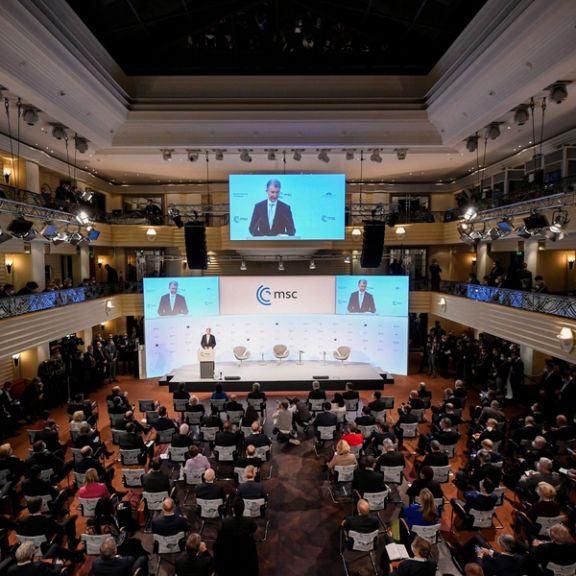
Iranian government is banned from the Munich Security Conference for the second year in a row as Tehran’s relation with the West reaches a breaking point.
Christoph Heusgen, head of the conference, said, "In the case of Iran, we are hearing from the German government and also from the Americans that there is no interest in talks. As things stand at the moment, we are only inviting Iranians from non-governmental organizations."
In addition to Iran, Russia and the German far-right party AFD have also not received invitations. Heusgen expressed skepticism regarding the prospect of meaningful dialogue with Russian President Vladimir Putin, opting instead to invite exiled politicians and representatives from non-governmental organizations.
The Munich Security Conference held an event with Iran Foreign Ministry thank-tank (IPIS) in October 2015 in Tehran, the same group that hosted a global Holocaust denial summit in 2006. Among those on the guest list, according to an invitation list seen by Iran International, was Qasem Soleimani, the slain commander of IRGC’s extraterritorial Quds Force. The MSC did not respond to Iran International’s requests for comment about co-hosting the event with the IPIS and the invitation of Soleimani to the conference.
Approximately 50 heads of state and government, along with around 100 ministers, are expected to attend this year's conference which is taking place from February 16 to 18.
The conference is globally renowned as one of the leading events to bring security policymakers together to discuss present and impending challenges. It comes at a time when Iran's proxy militias are causing havoc around the Middle East and major disruptions to global trade and shipping.
The decision to exclude Iran and Russia last year came amid ongoing global concerns. Iran's participation was halted following 2022 protests that saw hundreds killed, including numerous children, and thousands detained in connection to demonstrations. Similarly, Russia's exclusion was tied to its continued aggression against Ukraine.